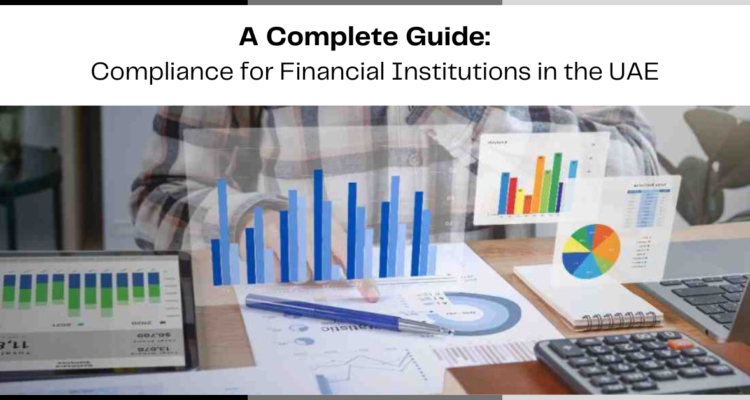The United Arab Emirates (UAE) is an attractive destination for UK entrepreneurs, offering a strategic…

Compliance for Financial Institutions in the UAE: A Complete Guide
In today’s highly regulated financial landscape, compliance is crucial for financial institutions operating in the UAE. The UAE has established a robust regulatory framework to ensure transparency, prevent financial crimes, and maintain the integrity of its financial sector. Non-compliance can lead to severe penalties, reputational damage, and legal consequences.
This guide will help you understand compliance requirements, key regulations, benefits, and how financial institutions can ensure full compliance.
What is Compliance in Financial Institutions?
Compliance refers to the process of ensuring that financial institutions adhere to local and international regulatory standards. This includes anti-money laundering (AML), counter-terrorism financing (CTF), tax compliance, and financial reporting obligations. The aim is to safeguard financial systems from fraud, corruption, and illicit activities.
Key Regulatory Authorities in the UAE
Financial institutions in the UAE must comply with regulations set by various authorities, including:
- Central Bank of the UAE (CBUAE) – Oversees banking and financial institutions, ensuring stability and compliance with monetary policies.
- Financial Services Regulatory Authority (FSRA) – Regulates financial services in Abu Dhabi Global Market (ADGM).
- Dubai Financial Services Authority (DFSA) – Regulates businesses operating in the Dubai International Financial Centre (DIFC).
- Securities and Commodities Authority (SCA) – Supervises securities and commodities markets in the UAE.
- Executive Office for Anti-Money Laundering & Counter Terrorism Financing (AML/CTF Office) – Implements national policies to prevent financial crimes.
- Ministry of Economy (MoE) – Manages the compliance of designated non-financial businesses and professions (DNFBPs).
Essential Compliance Requirements
1. Anti-Money Laundering (AML) & Counter-Terrorism Financing (CTF)
Financial institutions must implement AML and CTF policies to detect and prevent illegal financial activities. This includes:
- Conducting customer due diligence (CDD) and know-your-customer (KYC) procedures.
- Reporting suspicious transactions to the UAE Financial Intelligence Unit (FIU).
- Implementing risk-based approaches to monitor high-risk transactions.
2. Regulatory Reporting & Record-Keeping
Banks and financial service providers must submit periodic reports to regulatory bodies, ensuring transparency and accountability. Reports include:
- Financial statements.
- Risk assessment reports.
- AML and CTF compliance reports.
3. Data Protection & Cybersecurity Compliance
With the increasing threat of cybercrime, financial institutions must comply with data security regulations. The UAE has introduced cybersecurity frameworks to protect sensitive financial data from breaches and cyberattacks.
4. International Compliance Standards
- FATF (Financial Action Task Force) Guidelines – UAE follows FATF recommendations to combat money laundering and terrorist financing.
- OECD Common Reporting Standard (CRS) – Requires financial institutions to share tax-related information of account holders.
- US Foreign Account Tax Compliance Act (FATCA) – UAE financial institutions must report US account holders to avoid penalties.
5. Risk Management & Internal Controls
Financial institutions must establish risk management frameworks to prevent regulatory violations. This includes:
- Internal audits and risk assessments.
- Employee training on compliance regulations.
- Appointing a compliance officer to oversee regulatory adherence.
Benefits of Compliance for Financial Institutions
Ensuring compliance offers various benefits to financial institutions, including:
- Avoiding Legal Penalties – Non-compliance can result in hefty fines, legal actions, and business restrictions.
- Building Trust & Credibility – Regulatory compliance enhances credibility among investors, customers, and partners.
- Protecting Against Fraud & Financial Crimes – Effective compliance frameworks reduce risks related to fraud, corruption, and money laundering.
- Facilitating International Transactions – Compliance with global standards enables smoother cross-border transactions and partnerships.
- Improving Operational Efficiency – Streamlined compliance procedures lead to better financial management and governance.
Steps to Ensure Full Compliance
Step 1: Conduct a Compliance Audit
Assess current policies and identify gaps in compliance to align with UAE regulatory requirements.
Step 2: Implement a Robust Compliance Framework
Develop policies for AML, data security, and risk management. Ensure proper documentation and reporting mechanisms are in place.
Step 3: Train Employees on Compliance Regulations
Regular training programs help employees stay updated with regulatory changes and compliance best practices.
Step 4: Use Technology for Compliance Monitoring
Utilizing AI-driven compliance tools can help financial institutions track transactions, detect fraud, and manage risks more effectively.
Step 5: Engage Compliance Experts
Hiring professional consultants or legal advisors ensures that institutions remain compliant with evolving regulations.
Conclusion
Compliance is a critical component of financial institutions in the UAE. Adhering to regulatory standards not only ensures legal protection but also enhances credibility, security, and operational efficiency. By implementing strong compliance frameworks, financial institutions can mitigate risks, foster trust, and contribute to a stable financial ecosystem in the UAE.For expert assistance in ensuring full compliance for your financial institution, contact our team at Konsultancy today!
Frequently Asked Questions (FAQs)
1. Why is compliance important for financial institutions in the UAE?
Compliance ensures financial institutions operate legally, maintain transparency, prevent financial crimes, and build trust with stakeholders.
2. What are the penalties for non-compliance in the UAE?
Non-compliance can result in hefty fines, license suspension, legal actions, and reputational damage.
3. How can financial institutions improve AML compliance?
Financial institutions can strengthen AML compliance by implementing KYC procedures, transaction monitoring systems, and suspicious activity reporting mechanisms.
4. What is the role of a compliance officer in a financial institution?
A compliance officer oversees regulatory adherence, conducts risk assessments, ensures timely reporting, and educates employees on compliance policies.
5. How can technology help financial institutions stay compliant?
AI-driven compliance solutions can automate regulatory reporting, detect fraudulent transactions, and enhance risk management.




